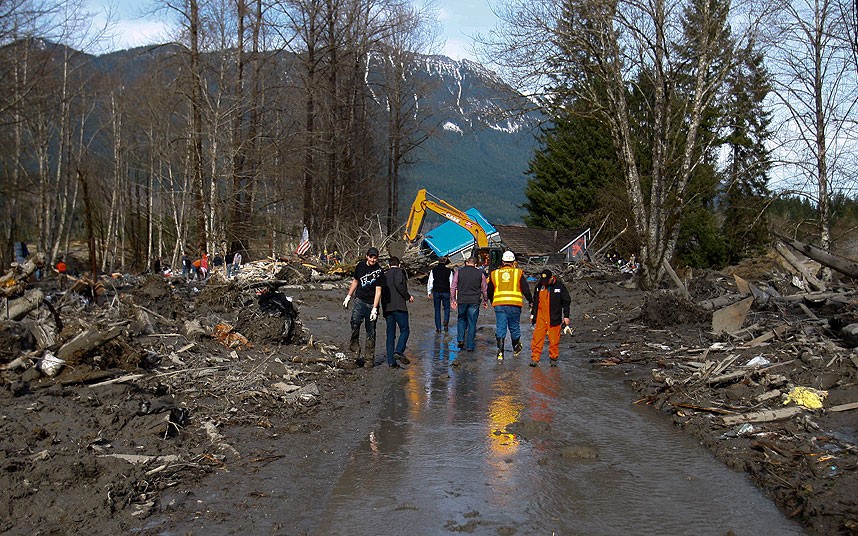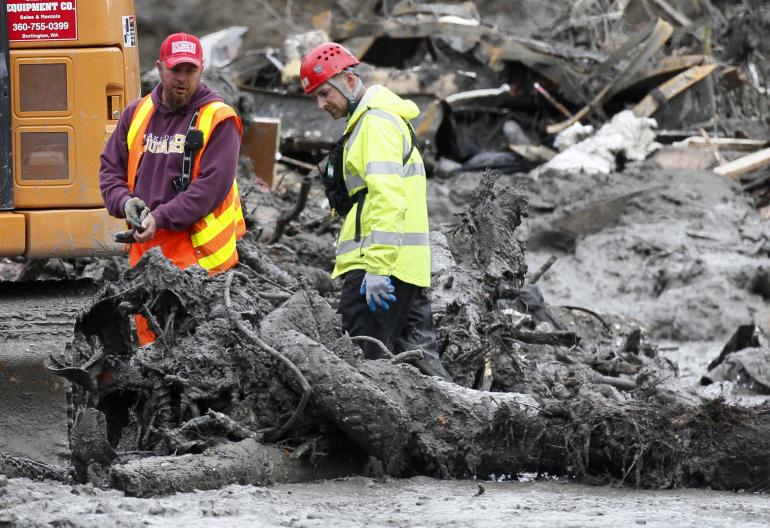Washington mudslide: America’s under-reported tragedy
Daily News Article — Posted on April 1, 2014
 (by Raf Sanchez, London’s Daily Telegraph) – When the mountain that stood silent guard over the little town of Oso came crashing down in a mile-wide wave of mud and destruction last week, its residents were either lingering at the breakfast table or lazing in front of early morning television.
(by Raf Sanchez, London’s Daily Telegraph) – When the mountain that stood silent guard over the little town of Oso came crashing down in a mile-wide wave of mud and destruction last week, its residents were either lingering at the breakfast table or lazing in front of early morning television.
In a matter of seconds, the wave of debris ripped apart 30 homes and completely redrew the forested landscape that Oso’s lumberjacks and woodsmen once knew so well.
The death toll is 18, ranging from a four-month-old baby to a grandmother preparing for her granddaughter’s summer wedding.

Washington Gov. Jay Inslee and a small group walk eastward on a cleared swath of SR 530, toward the first house that lies in a heap across the highway. (AP Photo)
But with 30 people still missing and no survivors found* in a week of searching, it is clear that the rural county of Snohomish has suffered an unprecedented tragedy. [*Several survivors were found on the day of the mudslide, including a 4-year old boy, see video below. Everyone who was discovered alive in the mud pile was rescued by helicopter within the first few hours after the landslide, and rescuers have not found further signs of life, officials said.]
“We always want to hold out hope but we have to at some point expect the worst,” said Gary Haakenson, the county executive director. …
On the morning after last Saturday’s mudslide no national news anchors rushed to the scene in brightly-colored windbreakers, as they do after tornadoes or school shootings.
President Obama briefly asked Americans to pray for Oso on Tuesday but since then has said nothing even as the death toll ticked ever upwards.

Workers look at debris in the mudslide near Oso, Washington March 26, 2014. (Reuters/Rick Wilking)
“Why do people care more about a missing plane in Asia than something happening here in America?” asked Shawna Richter, a mother of five, as she stood by a notice board with hand drawn posters of the missing.
The answer may partly lie in the maddeningly slow pace of the mission to recover the dead. Rescuers are wading through quicksand-like mud, in some places 20 ft deep, and driving rain has kept helicopters out of the air.
Houses have been ripped from their foundations and hurled hundreds of feet, frustrating the effort to figure out where to even begin looking.
Once a victim’s remains are found by cadaver dogs and flown out of the disaster zone, they are taken for formal identification, a sometimes difficult process given their horrific injuries. As a result, the confirmed number of fatalities has hovered in the mid-twenties even though it is likely to be [higher].
The tragedy may simply be moving too slowly for cable news. But it also occurred in a part of America where the television cameras rarely venture.
The mountain town of Darrington, Oso’s neighbor, is just 56 miles from Seattle, but it is a world away from the cosmopolitan Pacific home of Starbucks, Microsoft and Amazon.
The drive into Darrington takes you past the lumber yard that once provided ample employment for the town’s men. Although the yard still runs…there is less demand for wood and fewer jobs than before. Mobile phone reception is patchy and many residents are reliant on the town’s small library to get access to a computer. …
But if the national cameras had come to Darrington, they would have captured the resilience of a small American town pulling together. …
“There’s an enormous amount of grief here because of this square mile of mountain coming down,” Jay Inslee, the governor of Washington state, told The Telegraph. “But there are also a thousand acts of inspiration and compassion.”
In the town’s community center, beneath pennants hailing the sporting prowess of the Darrington Loggers basketball team, schoolchildren make hundreds of packed lunches for emergency responders.
Human chains of burly men in plaid shirts carry piles of donated food, water and diapers out of trucks and into the high school gym.
Dan Rankin, a mayor elected in a race where only 242 people cast ballots, stays in the center until midnight to hug constituents despite his own bleary-eyed exhaustion.
Perhaps the best example is Janet Cabe, an 81-year-old widow who for the past six decades has cooked dinner for grieving families after nearly every death in Darrington and neighboring towns.
The tradition began in 1950, when she and her late husband made tuna fish sandwiches for hungry strangers who had nowhere to eat after attending a funeral.
Since then she and a group of local women have served thousands of meals for mourners, with Mrs. Cabe sometimes making 60lbs of potato salad for a single gathering.
[Some] years she and the other members of the Memorial Dinner Committee might face up to 80 funerals. In the wake of the mudslide are likely to have [many] in just a few weeks.“We’ve still got a lot of people down there in the mud,” said Mrs. Cabe, in a brief break from cooking turkey for exhausted rescuers. “But we’re ready to do all of them. It’s our way of chipping in and showing that we care.”
Reprinted here for educational purposes only. From a Telegraph news report. May not be reproduced on other websites without permission from the Daily Telegraph.
Questions
1. What do you learn from this article about the tragic mudslide in Washington state:
a) Where did the tragedy occur?
b) When did it happen?
c) How many people were killed/ are still missing?
d) How many survivors have been found?
2. a) How has President Obama responded to this tragedy?
b) The reporter implies that the President has not paid enough attention to Oso. Do you think this is a fair assertion? Explain your answer.
3. How does the media generally respond to natural disasters or other events in which a large number of people are killed?
4. What explanation does the reporter offer for why it appears the media has not focused as much attention on this story?
5. By including the story of Janet Cabe, as well as the mayor and schoolchildren, the Telegraph reporter attempts to give readers a brief picture of average people coming together in the face of tragedy. Is it important that the media provide more stories like this? Why or why not?
6. a) Shawna Richter, a mother of five who lives in the community asked, "Why do people care more about a missing plane in Asia than something happening here in America?" Does Mrs. Richter make a good point? Explain your answer.
b) Why do you think the media has not focused a lot of attention on this story, or sent national news teams to the area the way they have for other national disasters?
c) Do you think people really don't care about the huge devastation faced by our fellow Americans in this small town in Washington? Explain your answer.
Background


